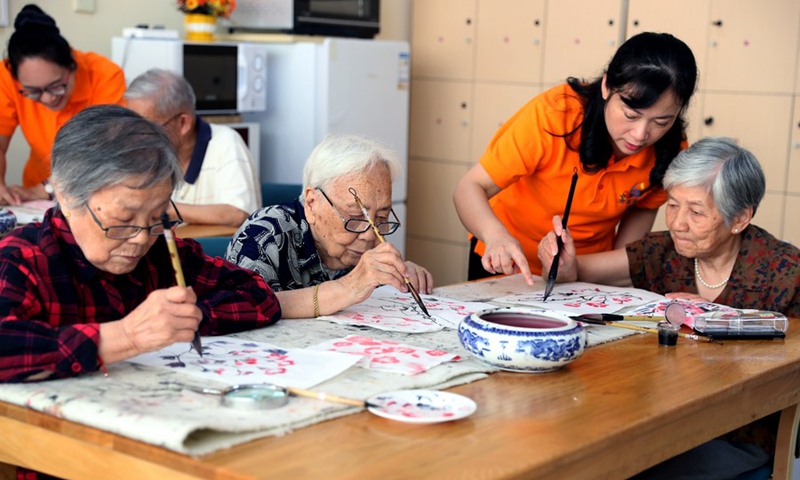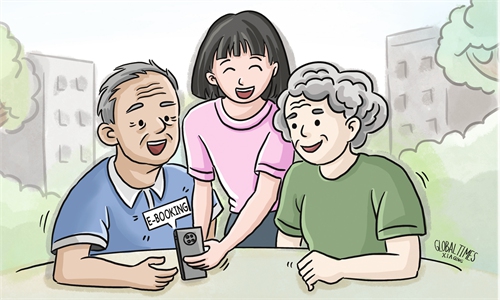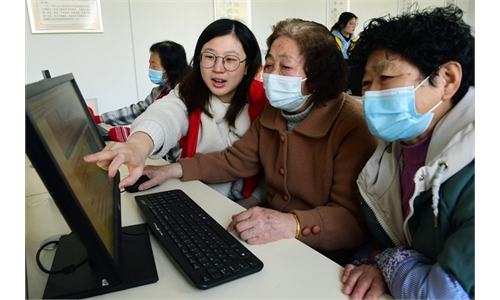
Senior citizens learn to draw at a civic center in Hongkou District, Shanghai. File photo: Xinhua
As China now has the biggest and one of the fastest-growing aging populations in the world, tackling the issue was a hot topic during the recently concluded two sessions. While specific measures have been proposed, it is equally important to adopt active and positive attitudes toward the elderly.
According to data released by the National Public Commission in September 2022, it is estimated that by 2025 the number of Chinese people aged 60 and above will exceed 300 million, making up 20 percent of the total population. This marks China's entry into a moderately aging society. By 2035, this number is projected to exceed 400 million, accounting for 30 percent of the population, indicating that the country will be classified as a severely aging society.
The aging population is a social structural change that cannot be reversed. Tackling this issue and providing satisfactory services for the elderly remains an arduous task for China.
In recent years, the Chinese government has attached great importance to solving the aging problem. During the two sessions, the China National Committee on Ageing was incorporated into the Ministry of Civil Affairs to take on more responsibilities in coordinating, supervising, and organizing work related to the aging population. Additionally, in early March, the National University of the Elderly was established. As the first national-level university for the elderly in China, it aims to create a public service platform for their continued learning, maintaining a healthy body and mind, and social engagement.
Alongside the government's efforts, it is important for society as a whole to take actions to ensure that the elderly can live a better life.
Currently, China's state-owned elderly services cannot meet all the needs of the elderly. Therefore, it requires the whole of society, especially the private sector, to jointly develop the elderly service industry, as it is an important part of China's high-quality development. As a Chinese saying goes, "When taking care of the elderly people in our own family, we must not forget those with no kinship with us." This shows the fine tradition of the Chinese nation in respecting and caring for the older generations. Therefore, society should take a more active attitude in dealing with the aging problem by providing more complete services to cater to the needs of the elderly.
One proposal raised by a National People's Congress deputy during the two sessions was that a long-term elderly care insurance system should be established by 2025, with costs shared by the state, companies, and individuals. This insurance should expand coverage in both urban and rural areas.
More importantly, people should change their attitudes toward the elderly. In China's traditional mindset, the elderly are expected to "lay back" and "just enjoy themselves in their later life." However, today more and more elderly people want to "do something" or "be part of society" rather than just be onlookers.
One elderly person said, "The period after retirement is the prime time in my life." Having worked for his entire life, he plans to enjoy life as much as possible. Different people have different needs - some with good health and pensions may like to travel, while others may prefer to learn artistic skills through courses offered at senior universities. There are also those who live alone at home and may want to find a new partner in their later years.
During the Second World Ageing Conference held in Spain in 2002, an "active aging" consensus was reached. This means building a society where the elderly can enjoy both physical and mental health by taking an active part in society and can feel valuable instead of being looked after or even seen as a burden. In fact, the elderly have a lot of social and work experience, making them a valuable resource for society. To achieve this goal, changing social attitudes are essential.
Although technological advancements continue to benefit society, it may put elderly people in awkward situations. Recently, some seniors were blocked from entering a famous scenic spot in a city because they were not familiar with booking tickets online as recently required. This highlights the neglect of the special needs of the elderly. While their slow response to new ideas and skills may be a factor, their deteriorating physical abilities in seeing, hearing, and logical thinking are more important. Therefore, people from all walks of life should learn to be patient and understanding towards the elderly and find amicable ways to help them. Fortunately, the National Senior University offers courses to help seniors overcome these difficulties.
The Chinese government has long considered solving the aging problem to be a major strategic goal. The first step to realizing this goal is to change the traditional mindset of society and provide better services for the elderly, so that they can have a greater sense of contentment, security, and happiness. This is also crucial to achieving high-quality development in China.


